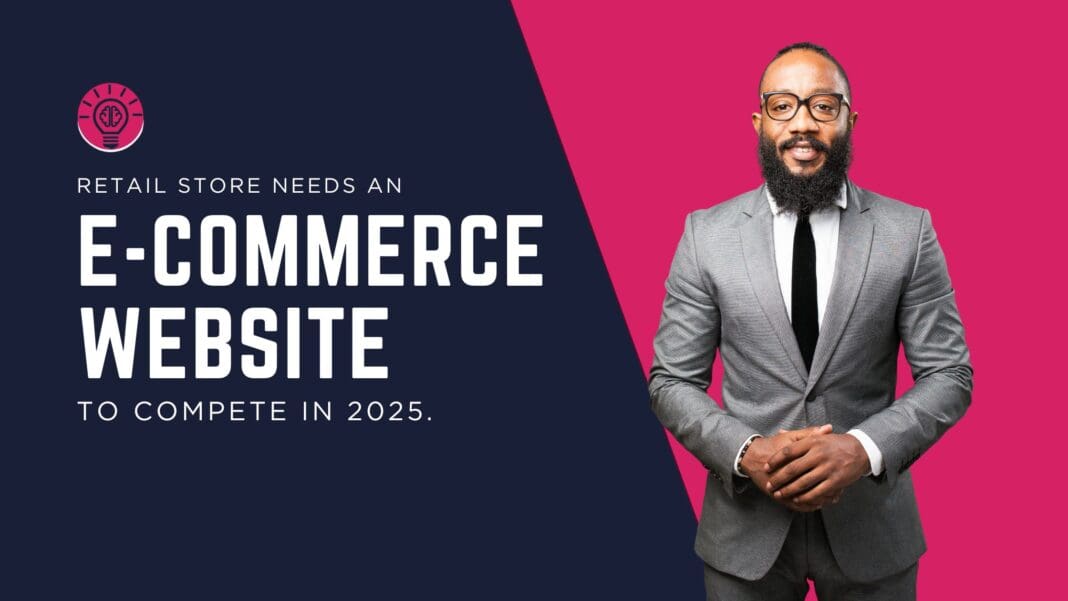In 2025, running a successful retail business without an e-commerce website is no longer a viable option. The world has shifted to online shopping, and consumer behavior continues to evolve. With more people shopping online than ever before, your physical store needs an online presence to stay competitive, increase sales, and reach a broader audience. If you’re still relying solely on foot traffic, you risk falling behind.
In this article, we’ll dive into the top reasons why your retail store needs an e-commerce website in 2025 and how it can transform your business for the better. Let’s explore why an online store is no longer a luxury but a necessity.
1. Meet the Demands of Modern Consumers
In today’s fast-paced world, customers expect the convenience of shopping from anywhere, anytime. This means offering an e-commerce experience that allows them to browse products, compare prices, and make purchases without leaving the comfort of their home or office. Retail stores without an e-commerce website are missing out on these customer expectations.
Why it matters:
- 24/7 Availability: An online store never closes, allowing you to sell products round the clock.
- Convenience for Shoppers: Consumers prefer the flexibility to shop when it fits their schedule, whether it’s day or night.
Actionable Tip: Ensure your e-commerce website is easy to navigate, mobile-responsive, and offers an intuitive shopping experience to meet customer needs anytime, anywhere.
2. Expand Your Reach Beyond Your Local Market
A physical retail store limits your reach to your geographic location, but an e-commerce website opens the door to a global customer base. In 2025, selling online isn’t just a trend—it’s essential for business growth. With an online store, your products can be seen and bought by customers from anywhere in the world.
Why it matters:
- Broader Customer Base: An online store removes the geographical barriers of your physical location, allowing you to tap into a larger audience.
- Access to New Markets: You can expand your brand’s visibility across different regions and even internationally, growing your business faster.
Actionable Tip: Utilize SEO techniques to make your e-commerce website discoverable by global customers. Leverage online marketing strategies like social media ads and email campaigns to increase visibility.
3. Stay Competitive in a Digital-First World
In 2025, most retail businesses, big or small, have an e-commerce website. If you don’t, you risk being outpaced by competitors who offer online shopping. In fact, studies show that 63% of all retail sales are influenced by digital interactions, even if the purchase is made in-store. Without an online presence, you’re likely to lose potential customers to more digitally-savvy competitors.
Why it matters:
- Stay Relevant: Having an e-commerce website ensures you don’t fall behind your competitors who are already selling online.
- Leverage Online Sales Trends: The shift toward digital-first shopping isn’t just temporary—it’s here to stay. Businesses without a website may find themselves struggling to survive.
Actionable Tip: Invest in a professional e-commerce website design that gives your business a competitive edge. Offer a user-friendly interface, smooth checkout process, and seamless browsing experience to retain customers.
4. Increase Sales and Revenue Streams
The most significant benefit of having an e-commerce website is the potential to increase your sales and create new revenue streams. By offering your products online, you open the door to impulse purchases, repeat customers, and a broader range of products to sell. With an online store, the opportunities for growth are endless.
Why it matters:
- Higher Conversion Rates: E-commerce websites make it easier for customers to browse and buy, increasing the likelihood of conversion.
- Multiple Payment Options: Offering various payment methods like credit cards, PayPal, and digital wallets makes purchasing easy for your customers, further encouraging sales.
Actionable Tip: Use upselling and cross-selling techniques on your e-commerce website to encourage higher-order values. Provide recommendations based on what the customer is already viewing or has previously purchased.
5. Provide a Seamless Shopping Experience
One of the key elements of an e-commerce website is the ability to provide a seamless and enjoyable shopping experience. Customers want quick load times, easy navigation, detailed product information, and smooth checkout. An e-commerce website allows you to control the entire experience, making it as simple and enjoyable as possible for your customers.
Why it matters:
- Customer Satisfaction: A well-designed website with intuitive navigation leads to higher customer satisfaction and loyalty.
- Lower Cart Abandonment Rates: A smooth, streamlined checkout process reduces friction and encourages customers to complete their purchases.
Actionable Tip: Optimize your product pages with high-quality images, detailed descriptions, and customer reviews. Make sure the checkout process is quick, secure, and offers multiple payment options to cater to all customer preferences.
6. Collect Data to Better Understand Your Customers
An e-commerce website not only allows you to sell products but also helps you gather valuable customer data. From tracking purchasing behavior to analyzing customer preferences, your online store can provide insights into what drives sales and how to improve your offerings.
Why it matters:
- Targeted Marketing: Understanding your customers’ purchasing habits helps you tailor your marketing efforts and product offerings.
- Improved Customer Experience: With data analytics, you can personalize the shopping experience, offering discounts or products based on previous behavior.
Actionable Tip: Use Google Analytics or other e-commerce analytics tools to track customer behavior. Look at bounce rates, time spent on the site, and products viewed to refine your marketing and sales strategies.
7. Cost-Effective Marketing Opportunities
Unlike traditional brick-and-mortar stores that rely on print advertising, billboards, or flyers, an e-commerce website allows you to leverage digital marketing strategies at a much lower cost. Social media, SEO, content marketing, and email campaigns are affordable yet powerful ways to drive traffic to your online store and convert visitors into customers.
Why it matters:
- More Affordable than Traditional Advertising: Digital marketing provides a more cost-effective way to promote your store to a large audience.
- Highly Targeted Campaigns: Online advertising allows you to target specific customer demographics, improving the chances of converting leads into sales.
Actionable Tip: Implement SEO strategies to make your website more visible on search engines. Additionally, consider running paid social media ads to target specific audiences based on location, age, and interests.
8. Enhance Customer Convenience with Online Shopping Features
Having an e-commerce website means you can offer valuable features that improve the convenience of your customers, like online ordering, shopping carts, customer accounts, and easy returns. These features enhance the shopping experience, making it easier for customers to make purchases and manage their orders.
Why it matters:
- Convenience is Key: Offering easy online ordering and customer accounts allows customers to manage their orders and shopping preferences without hassle.
- Encourages Repeat Business: Features like wish lists, saved carts, and easy reordering encourage customers to return to your site and make additional purchases.
Actionable Tip: Allow customers to create accounts for easy order tracking and offer them personalized recommendations based on their previous purchases. Also, implement a simple return policy to build trust and convenience.
Conclusion: Build Your E-Commerce Website for the Future
In 2025, an e-commerce website is no longer a “nice-to-have” for retail stores; it’s a necessity. By setting up an online store, you can reach more customers, increase sales, enhance the shopping experience, and stay competitive in an increasingly digital world. If you want to survive and thrive in the future of retail, it’s time to embrace e-commerce.
At Detroit Website Design Co, we specialize in creating custom e-commerce websites that not only look great but also deliver results. If you’re ready to take your retail store online and grow your business, contact us today and let’s start building your future together!








